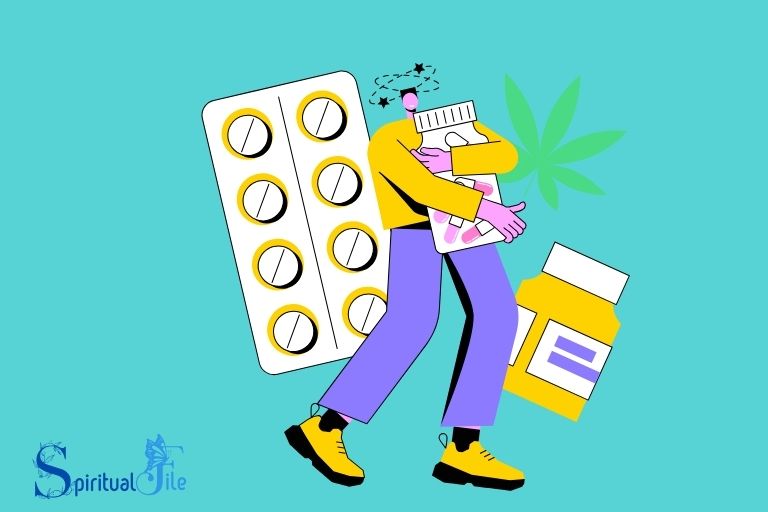Moral Spiritual Changes in Drugs Examples: Priorities!
Drug use can lead to significant moral and spiritual changes in a person. These changes may include a shift in values and priorities, a disregard for societal norms and ethical standards, and a loss of connection with a higher power or spiritual beliefs.
Drugs can have profound effects on a person’s mind and spirit. They can alter a person’s perception of reality, their sense of right and wrong, and their relationship with their spiritual beliefs.
This is because drugs can interfere with a person’s cognitive functions, including their ability to make sound decisions and judgments.
The moral and spiritual changes that come with drug use are often deeply distressing for the individual and those around them. These changes can be challenging to reverse, particularly without appropriate support and intervention.
To regain their sense of self, morals, and spirituality, individuals typically require professional treatment and therapy to help them recover from their substance abuse.
10 Drugs on Moral and Spiritual Changes
| Drug | Moral Change | Spiritual Change |
|---|---|---|
| Alcohol | Potential decrease in moral judgements, potential increase in violent or aggressive behavior | Possible feeling of disconnection from spiritual self, struggles with feelings of guilt or shame |
| Cocaine | Potential shift towards self-interest and disregard of others, potential increase in deceitful behavior | Possible loss of spiritual connection due to focus on drug, potential existential crisis |
| Marijuana | Potential changes in perception of right and wrong, possible increase in apathy | Potential shifts in spirituality, either towards introspection or away from prior spiritual beliefs |
| Heroin | Possible loss of moral compass due to addiction, potential increase in criminal activity | Possible feelings of alienation from spiritual self, potential hopelessness |
| Methamphetamines | Potential increase in violent behavior, loss of self-control | Potential deepening of spiritual crisis, feelings of being consumed by drug |
| LSD | Potential changes in moral perspective, possibly more open-mindedness | Potential intense spiritual experiences, feelings of unity with universe |
| MDMA (Ecstasy) | Potential increase in empathetic behavior, potential disregard for personal safety | Potential feelings of connection with others, increased sense of spiritual community |
| Prescription Drugs (Abuse) | Potential deceitful behavior to obtain drugs, potential disregard for laws | Possible feelings of shame or guilt, potential loss of faith in self |
| Nicotine | Potential disregard for personal health, potential lack of concern for others’ health (secondhand smoke) | Possible disconnect from spiritual self due to addiction, potential existential crisis |
| Cannabis | Potential apathy, potential changes in perception of right and wrong | Potential shifts in spirituality, increased introspection or deviation from prior beliefs |
Key Takeaway

Five Facts About: Drugs on Moral and Spiritual Changes
Understanding The Impact Of Drugs On Morality
Drugs have a profound impact on morality, causing significant spiritual and moral changes within individuals.
These changes can manifest in various ways, altering one’s sense of right and wrong, as well as their ethical decision-making processes. From altered perceptions to shifts in values, drugs leave an indelible mark on our moral compass.
The impact of drugs on morality is a complex topic that requires careful examination. When individuals engage in drug use, it can give rise to various psychological and behavioral changes, ultimately influencing their ethical decision-making processes.
Understanding these connections is essential to recognizing the profound effects that drugs can have on an individual’s moral compass.
Psychological And Behavioral Changes:
Increased risk-taking behavior: Drugs can lead to impulsive actions and a decreased ability to assess potential risks or consequences accurately. This can result in individuals making choices that they would typically deem morally unacceptable.
Altered perception and judgment: Drugs can distort an individual’s perception of reality, leading to impaired judgment. This may cause individuals to engage in behaviors they would typically consider unethical or morally wrong.
Enhancements of negative emotions: Certain drugs can intensify negative emotions such as anger, aggression, and irritability.
These heightened emotions can influence an individual’s moral behavior and decision-making processes, potentially leading to harmful or unethical actions.
Diminished empathy and compassion: Substance abuse can dull an individual’s ability to empathize with others and consider their emotions and well-being.
This lack of empathy can compromise an individual’s moral compass, making them more likely to engage in morally questionable behaviors.
Ethical Decision-Making And Drug Use:
Impaired cognitive functioning: Drugs can impair an individual’s cognitive abilities, making it more challenging to engage in moral reasoning and decision-making. This impairment can lead to individuals making choices that conflict with their usual moral principles.
Lowered inhibitions: Drug use can decrease an individual’s inhibitions, making them more likely to engage in behaviors that they would typically avoid due to ethical considerations. This can result in moral compromises and violations.
Altered value systems: Drugs can significantly alter an individual’s value system, causing them to prioritize immediate gratification and their addiction over more morally upright pursuits.
This shift in values can lead to individuals engaging in unethical behaviors to sustain their drug use.
Influences from social circles: Drug use often occurs within specific social circles. These circles may have their own set of moral values and norms, which can influence an individual’s ethical decision-making.
Conforming to the moral standards of the drug-using community can result in moral compromises.
Legal and societal consequences: Engaging in drug use often comes with legal and societal repercussions. Individuals may find themselves in situations where they must compromise their ethics to avoid these consequences or protect their drug-related activities.
Understanding the impact of drugs on morality is crucial for addressing drug abuse and its associated ethical challenges.
By recognizing the psychological and behavioral changes caused by drugs and understanding how drug use affects ethical decision-making, society can better support individuals in making morally sound choices and foster a culture of responsibility and compassion.
Exploring Spiritual Transformations Through Drug Use
Exploring spiritual transformations manifested through drug use showcases various examples of moral and spiritual changes resulting from these experiences. These transformations offer a unique perspective on personal growth and self-discovery.
Connection With The Self And Higher Power
- People who use drugs sometimes report experiencing a deep connection with their inner selves and the mystical aspects of spirituality.
- This connection is often referred to as a journey of self-discovery, enabling individuals to explore their identities, beliefs, and values in profound and introspective ways.
- Some individuals also describe a heightened sense of awareness and a feeling of being connected to a higher power or a universal consciousness.
- The use of certain hallucinogenic substances, such as ayahuasca or psilocybin mushrooms, is believed to facilitate these spiritual experiences.
Altered States Of Consciousness And Spirituality
- Drug-induced altered states of consciousness have long been associated with spiritual experiences in various cultures and traditions.
- These altered states can allow individuals to transcend their ordinary perception of reality and gain insights into the nature of existence, the interconnectedness of all things, and the deeper meaning of life.
- For some, the experience can be transformative, leading to a profound shift in their understanding of themselves and the world around them.
- It is important to note that not all drug experiences result in spiritual transformations, and the context, dosage, and intention behind drug use play a significant role in shaping these experiences.
Case Studies: Drugs And Moral Spiritual Changes
Discover real-life case studies illustrating moral spiritual changes in drug use, highlighting how individuals transform their outlook and values through personal experiences.
These examples shed light on the complex dynamics between drugs and the profound shifts in one’s moral and spiritual compass.
Lsd And The Expansion Of Consciousness:
- Lsd, or lysergic acid diethylamide, is a powerful hallucinogenic substance known for its ability to induce profound changes in consciousness.
- This psychedelic drug stimulates the serotonin receptors in the brain, altering perception, thoughts, and emotions.
- The use of lsd has been associated with spiritual experiences and a sense of connectedness to the universe.
- People who have taken lsd often report an expanded awareness of their thoughts, feelings, and the world around them.
- Lsd can promote a heightened sense of spirituality and an exploration of the deeper questions of life and existence.
Ayahuasca And Self-Reflection:
- Ayahuasca is a plant-based psychedelic brew used in religious ceremonies by indigenous tribes in the amazon rainforest.
- This sacred medicine contains the compound dmt, which induces intense visionary experiences and deep introspection.
- Ayahuasca is frequently used as a tool for self-reflection and personal growth.
- The experience with this powerful plant medicine often involves facing one’s fears and confronting unresolved emotional issues.
- Ayahuasca ceremonies can lead to transformative insights, spiritual revelations, and a profound understanding of oneself.
Psilocybin Mushrooms And Personal Growth:
- Psilocybin mushrooms, also known as magic mushrooms, contain the psychoactive compound psilocybin.
- These mushrooms have a long history of use in spiritual and shamanic practices.
- Psilocybin mushrooms can lead to a range of experiences, from mystical states of consciousness to profound emotional breakthroughs.
- When used in a therapeutic context, psilocybin mushrooms have been shown to facilitate personal growth and psychological healing.
- Users often report increased emotional openness, enhanced creativity, and a greater sense of connectedness with nature and the world.
Lsd, ayahuasca, and psilocybin mushrooms have been known to induce moral spiritual changes and catalyze personal growth.
These powerful substances offer transformative experiences, expanding consciousness and providing individuals with profound insights and a deeper understanding of themselves and the universe.
FAQ About Moral Spiritual Changes In Drugs Examples
What Is The Moral Spiritual Theory Of Addiction?
The moral spiritual theory of addiction is centered on the belief that addiction stems from a lack of moral and spiritual values in a person’s life.
This theory posits that addiction occurs when individuals attempt to fill a void or escape from negative emotions through substance abuse or compulsive behaviors.
By adopting moral and spiritual principles, such as self-discipline, honesty, and connection with higher powers, individuals can overcome addiction.
Emphasizing personal responsibility, this theory argues that moral and spiritual development is essential for recovery and maintaining sobriety.
Practicing mindfulness, meditation, and participating in support groups are common strategies used to cultivate these values.
This approach seeks to address the underlying issues that contribute to addiction and promote holistic healing.
What Is An Example Of The Moral Model Of Addiction?
An example of the moral model of addiction is the belief that addiction is solely the result of an individual’s moral failing.
This perspective holds that addiction is a choice and that those who are addicted lack willpower or moral character.
It places blame on the individual for their addictive behaviors and disregards external factors such as genetics or environment. The moral model often stigmatizes individuals with addiction, leading to judgment and discrimination.
It fails to recognize addiction as a complex medical condition with biological, psychological, and social components.
This perspective can obstruct access to appropriate treatment and support for individuals struggling with addiction.
What Is The Moral Issue Of Drug Abuse?
Drug abuse presents a moral issue due to the harmful consequences it brings to individuals and society. Drug abuse violates ethical and social principles, causing physical and psychological harm to users and those around them.
It undermines personal autonomy and responsibility, as individuals may become dependent on substances and unable to make rational choices.
The act of drug abuse also infringes on societal values, as it contributes to increased crime rates, strained healthcare systems, and economic burdens.
Drug abuse challenges the moral fabric of our communities, as it disregards respect for oneself and others.
By recognizing the moral dimensions of drug abuse, we can better address this issue through prevention, education, treatment, and support.
Can Drugs Affect Morals?
Yes, drugs can affect morals. Drug use can alter a person’s judgment, decision-making, and values, potentially leading to unethical behaviors and a shift in moral compass.
Substance abuse can impair cognitive functions and distort perceptions of right and wrong.
When under the influence, individuals may engage in morally questionable actions they wouldn’t consider while sober.
Drugs such as alcohol, cocaine, and opioids can influence behavior by suppressing inhibitions, increasing aggression, and impairing moral reasoning.
It’s important to note that not everyone who uses drugs will experience significant moral changes, as individual responses vary.
However, the potential impact on morals serves as a significant concern and reinforces the importance of avoiding substance abuse.
What Are Examples Of Moral Spiritual Changes In Drugs?
Moral spiritual changes in drugs can manifest as increased empathy, heightened sense of interconnectedness, and spiritual awakening.
Conclusion
The moral and spiritual changes brought about by drugs are both profound and far-reaching. These substances have the power to greatly impact our perception of the world and our place in it.
They can provide moments of enlightenment and connection to something greater than ourselves, but they can also lead to destructive behaviors and loss of moral compass.
It is crucial for individuals to approach drug use with caution and awareness, understanding the potential risks and rewards.
It is also important to recognize that morality and spirituality are deeply personal experiences, and what may work for one person may not resonate with another.
Overall, the journey towards moral and spiritual growth is a lifelong process, and drugs can be a catalyst or hindrance in that process.
It is up to each individual to navigate this terrain with mindfulness, self-reflection, and a commitment to personal growth.
By doing so, we can strive towards a more meaningful and fulfilling existence, irrespective of the challenges and temptations that come our way.






